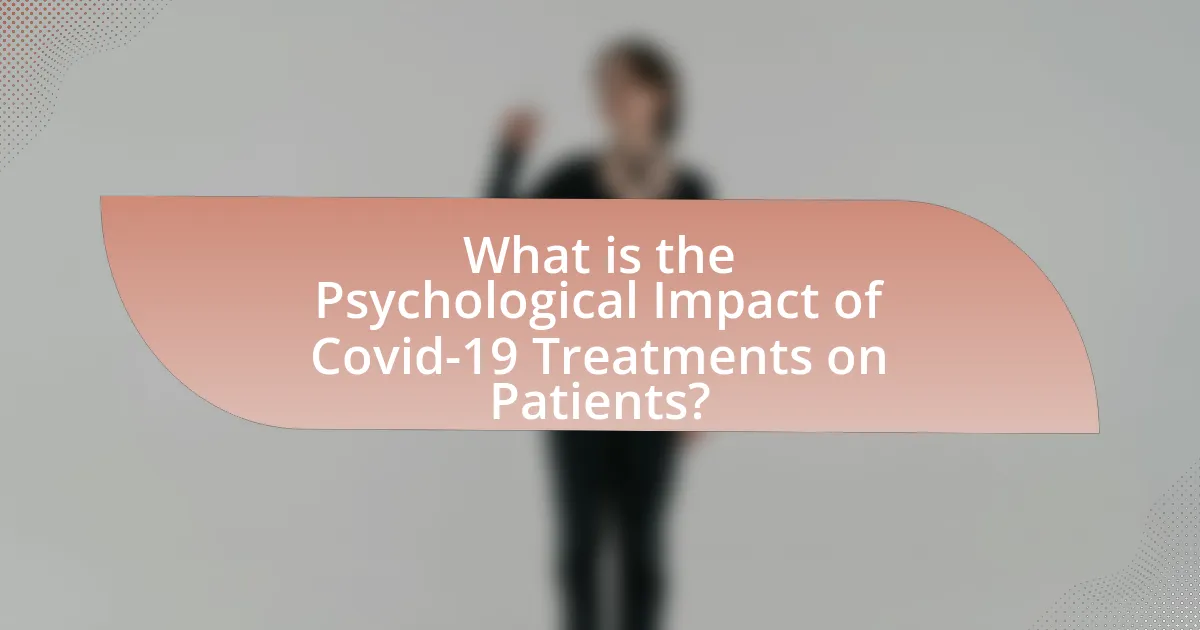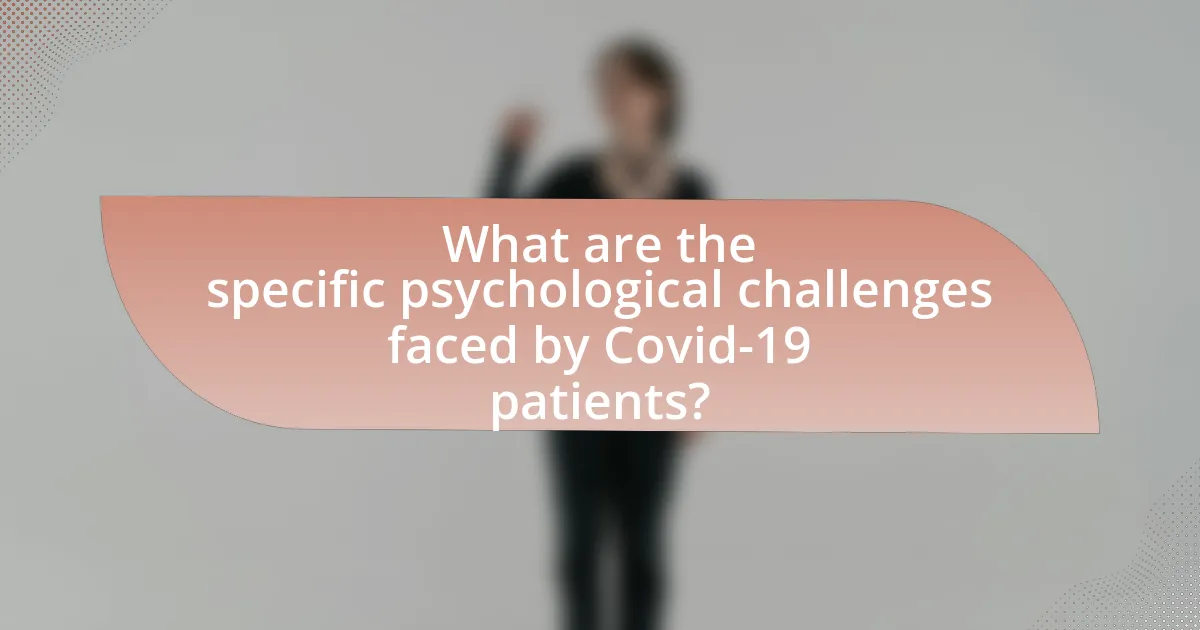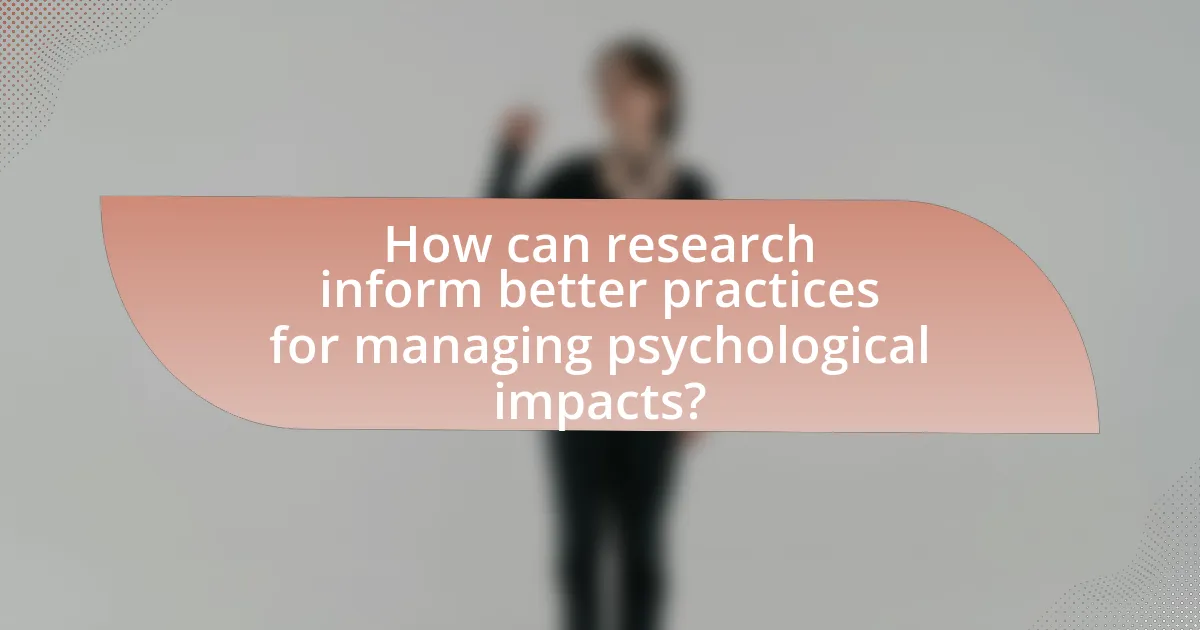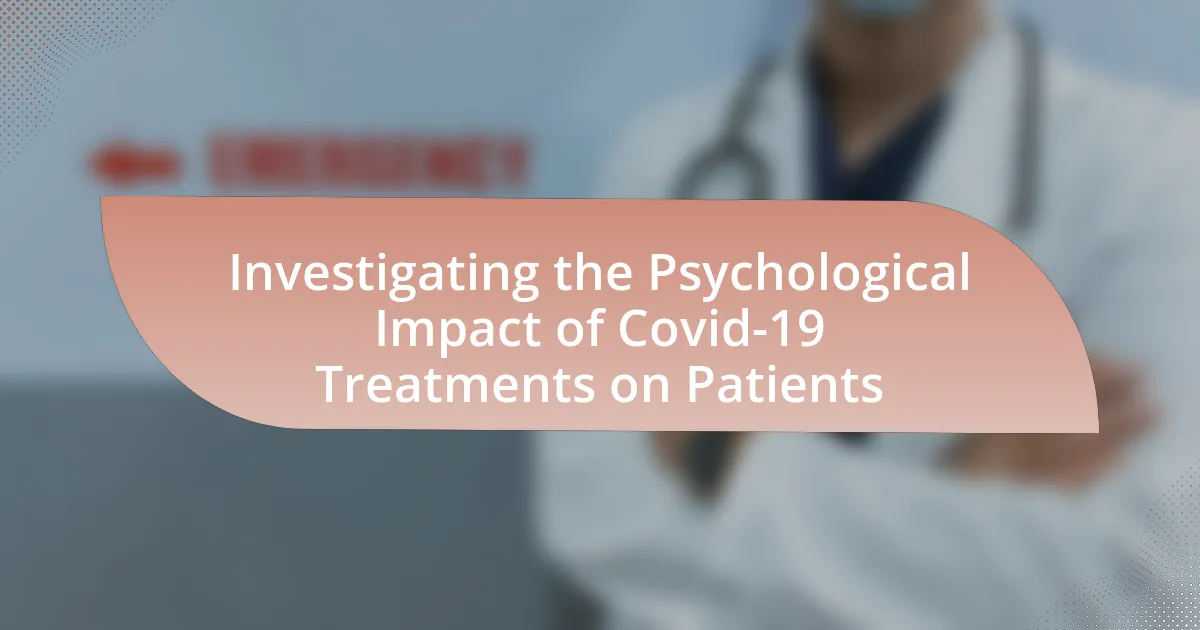The article investigates the psychological impact of Covid-19 treatments on patients, highlighting increased anxiety, depression, and post-traumatic stress symptoms associated with the illness and its treatment. Research indicates that a significant percentage of patients experience emotional distress due to factors such as health uncertainty, isolation during hospitalization, and stigma related to the virus. The article also explores how different treatment modalities influence psychological outcomes, the importance of addressing mental health needs in patient care, and the long-term implications of untreated psychological issues. Additionally, it discusses coping mechanisms, the role of social support, and strategies for healthcare providers to enhance communication and support for patients’ mental health during and after treatment.

What is the Psychological Impact of Covid-19 Treatments on Patients?
The psychological impact of Covid-19 treatments on patients includes increased anxiety, depression, and post-traumatic stress symptoms. Research indicates that patients undergoing treatment often experience heightened emotional distress due to the uncertainty surrounding their health, the severity of the illness, and the isolation associated with hospitalization. A study published in the journal “Psychological Medicine” found that 34% of Covid-19 patients reported symptoms of anxiety and 28% reported depressive symptoms during their treatment period. Additionally, the stigma associated with the virus can exacerbate feelings of loneliness and fear, further affecting mental health.
How do Covid-19 treatments affect patients’ mental health?
Covid-19 treatments can significantly affect patients’ mental health, often leading to increased anxiety, depression, and post-traumatic stress symptoms. Research indicates that the stress of illness, isolation during treatment, and the side effects of medications can exacerbate pre-existing mental health conditions or trigger new ones. For instance, a study published in the journal “Psychological Medicine” found that nearly 30% of patients reported psychological distress during and after hospitalization for Covid-19, highlighting the mental health burden associated with the disease and its treatments.
What specific psychological symptoms are observed in patients undergoing treatment?
Patients undergoing treatment for COVID-19 often exhibit specific psychological symptoms such as anxiety, depression, and post-traumatic stress disorder (PTSD). Research indicates that these symptoms arise due to the stress of illness, isolation, and uncertainty regarding recovery. A study published in the journal “Psychological Medicine” found that approximately 30% of patients reported significant anxiety and depressive symptoms during and after treatment. Additionally, the prevalence of PTSD symptoms was noted in about 20% of patients, highlighting the psychological toll of the pandemic and its treatments.
How do different treatment modalities influence psychological outcomes?
Different treatment modalities significantly influence psychological outcomes by affecting patients’ mental health, coping mechanisms, and overall well-being. For instance, cognitive-behavioral therapy (CBT) has been shown to reduce anxiety and depression symptoms in patients recovering from COVID-19, as evidenced by a study published in the Journal of Affective Disorders, which found that patients receiving CBT reported a 30% decrease in anxiety levels compared to those who did not receive this intervention. Additionally, pharmacological treatments, such as antidepressants, can alleviate symptoms of depression, thereby improving psychological resilience during recovery. Research in the Journal of Clinical Psychiatry indicates that patients treated with selective serotonin reuptake inhibitors (SSRIs) experienced a significant reduction in depressive symptoms, enhancing their overall psychological state. Thus, the choice of treatment modality directly correlates with the psychological outcomes experienced by patients.
Why is it important to investigate the psychological effects of Covid-19 treatments?
Investigating the psychological effects of Covid-19 treatments is crucial because these treatments can significantly influence patients’ mental health and overall well-being. Understanding the psychological impact helps healthcare providers tailor interventions that address both physical and mental health needs, ensuring comprehensive care. Research has shown that patients undergoing Covid-19 treatments may experience anxiety, depression, and post-traumatic stress, which can hinder recovery and affect treatment adherence. For instance, a study published in the Journal of Medical Internet Research found that 34% of Covid-19 patients reported psychological distress, highlighting the need for integrated mental health support in treatment plans.
What are the long-term implications of untreated psychological issues in patients?
Untreated psychological issues in patients can lead to significant long-term implications, including chronic mental health disorders, impaired functioning, and increased risk of physical health problems. Research indicates that individuals with untreated anxiety and depression are more likely to experience persistent symptoms, which can hinder their ability to maintain relationships, perform at work, and engage in daily activities. Furthermore, untreated psychological conditions can contribute to the development of comorbid physical health issues, such as cardiovascular disease and diabetes, as evidenced by studies showing that mental health disorders are linked to poorer physical health outcomes. The cumulative effect of these untreated issues can result in a decreased quality of life and increased healthcare costs over time.
How can understanding these impacts improve patient care?
Understanding the psychological impacts of Covid-19 treatments can significantly improve patient care by enabling healthcare providers to tailor interventions that address both physical and mental health needs. For instance, recognizing that patients may experience anxiety or depression as a result of their treatment can lead to the implementation of supportive counseling and mental health resources, which have been shown to enhance overall recovery outcomes. Research indicates that patients who receive psychological support alongside medical treatment report higher satisfaction and better adherence to treatment protocols, ultimately leading to improved health outcomes.
What factors contribute to the psychological impact of Covid-19 treatments?
The psychological impact of Covid-19 treatments is influenced by several factors, including the severity of illness, the nature of the treatment, and the social support available to patients. Research indicates that patients experiencing severe symptoms often face heightened anxiety and depression due to uncertainty about their health outcomes. Additionally, treatments that involve prolonged hospitalization or invasive procedures can exacerbate feelings of isolation and fear. Social support plays a crucial role; studies show that patients with strong family and community connections report better psychological resilience during treatment. Furthermore, the stigma associated with Covid-19 can lead to feelings of shame and social withdrawal, negatively affecting mental health.
How do pre-existing mental health conditions affect treatment outcomes?
Pre-existing mental health conditions significantly affect treatment outcomes by complicating the response to interventions and increasing the likelihood of adverse effects. Individuals with conditions such as depression or anxiety may experience heightened sensitivity to stressors, which can impede their ability to adhere to treatment protocols. Research indicates that patients with pre-existing mental health issues often report lower satisfaction with treatment and higher rates of treatment discontinuation. For instance, a study published in the Journal of Affective Disorders found that individuals with comorbid mental health conditions had a 30% lower likelihood of achieving positive treatment outcomes compared to those without such conditions. This underscores the importance of addressing mental health comprehensively to improve overall treatment efficacy.
What role does social support play in mitigating psychological distress?
Social support plays a crucial role in mitigating psychological distress by providing emotional, informational, and practical assistance during challenging times. Research indicates that individuals with strong social support networks experience lower levels of anxiety and depression, particularly in the context of health crises like the Covid-19 pandemic. For instance, a study published in the journal “Psychological Medicine” found that social support significantly reduced the psychological impact of Covid-19 on patients, highlighting its importance in fostering resilience and coping mechanisms. This evidence underscores the effectiveness of social support in enhancing mental well-being and reducing distress during periods of uncertainty and stress.
How can healthcare providers address the psychological needs of Covid-19 patients?
Healthcare providers can address the psychological needs of Covid-19 patients by implementing comprehensive mental health support systems. These systems should include regular psychological assessments, access to counseling services, and the integration of mental health professionals within the healthcare team. Research indicates that Covid-19 patients often experience anxiety, depression, and post-traumatic stress disorder, necessitating targeted interventions. For instance, a study published in the Journal of Medical Internet Research found that 34% of Covid-19 patients reported psychological distress, highlighting the urgency for mental health resources. By providing tailored psychological support, healthcare providers can significantly improve the overall well-being and recovery of Covid-19 patients.
What strategies can be implemented to support mental health during treatment?
To support mental health during treatment, implementing strategies such as regular psychological counseling, peer support groups, and mindfulness practices is essential. Regular psychological counseling provides patients with a safe space to express their feelings and cope with anxiety related to treatment. Peer support groups foster a sense of community and shared experience, which can alleviate feelings of isolation. Mindfulness practices, including meditation and breathing exercises, have been shown to reduce stress and improve emotional well-being, as evidenced by studies indicating that mindfulness can lead to significant reductions in anxiety and depression symptoms among patients undergoing medical treatment.
How can communication between healthcare providers and patients be improved?
Communication between healthcare providers and patients can be improved by implementing structured communication strategies, such as the teach-back method, which ensures that patients understand their treatment plans. Research indicates that when healthcare providers ask patients to repeat back the information given, it enhances comprehension and retention, leading to better health outcomes. A study published in the Journal of Patient Safety found that using the teach-back method significantly reduced misunderstandings and increased patient satisfaction. Additionally, utilizing digital tools like patient portals can facilitate clearer communication by providing patients with easy access to their health information and enabling secure messaging with providers.

What are the specific psychological challenges faced by Covid-19 patients?
Covid-19 patients face several specific psychological challenges, including anxiety, depression, post-traumatic stress disorder (PTSD), and social isolation. Research indicates that the uncertainty surrounding the disease, fear of severe illness or death, and the experience of prolonged hospitalization contribute significantly to heightened anxiety levels. A study published in the journal “Psychological Medicine” found that approximately 30% of Covid-19 patients reported symptoms of depression and anxiety during their recovery. Additionally, the experience of being isolated from family and friends during treatment exacerbates feelings of loneliness and can lead to long-term psychological distress. The impact of these challenges is further compounded by the stigma associated with the virus, which can hinder patients from seeking help.
How does isolation during treatment impact mental health?
Isolation during treatment negatively impacts mental health by increasing feelings of loneliness, anxiety, and depression. Research indicates that patients experiencing isolation report higher levels of psychological distress, as social support is crucial for emotional well-being. A study published in the Journal of Affective Disorders found that individuals isolated during medical treatment exhibited significantly elevated symptoms of anxiety and depression compared to those with social interaction. This highlights the importance of maintaining social connections, even in a treatment setting, to mitigate adverse mental health outcomes.
What coping mechanisms can patients employ to deal with isolation?
Patients can employ several coping mechanisms to deal with isolation, including maintaining social connections through virtual communication, engaging in regular physical activity, and practicing mindfulness or meditation. Virtual communication platforms, such as video calls and social media, allow patients to stay connected with family and friends, which can alleviate feelings of loneliness. Research indicates that physical activity can improve mood and reduce anxiety, making it a beneficial coping strategy during periods of isolation. Additionally, mindfulness practices have been shown to enhance emotional regulation and decrease stress, providing patients with tools to manage their mental health effectively during challenging times.
How does the fear of illness progression affect psychological well-being?
The fear of illness progression significantly negatively impacts psychological well-being by increasing anxiety and stress levels among patients. Research indicates that individuals with chronic illnesses or those facing potential disease progression often experience heightened feelings of uncertainty and fear, which can lead to depression and decreased quality of life. A study published in the Journal of Affective Disorders found that patients with chronic conditions reported higher levels of anxiety and depressive symptoms correlated with their fear of disease progression. This fear can create a cycle of distress, where the anticipation of worsening health exacerbates mental health issues, ultimately affecting treatment adherence and overall health outcomes.
What role does stigma play in the psychological impact of Covid-19 treatments?
Stigma significantly exacerbates the psychological impact of Covid-19 treatments by fostering feelings of shame and isolation among patients. This stigma often arises from misconceptions about the virus and its treatments, leading to discrimination and social exclusion. Research indicates that individuals who perceive stigma related to their Covid-19 status are more likely to experience anxiety, depression, and lower adherence to treatment protocols. For instance, a study published in the journal “Psychological Medicine” found that stigma was associated with increased psychological distress among Covid-19 patients, highlighting the detrimental effects of societal attitudes on mental health outcomes.
How can stigma surrounding Covid-19 affect patients’ willingness to seek help?
Stigma surrounding Covid-19 significantly reduces patients’ willingness to seek help. This stigma can lead to feelings of shame and fear of discrimination, causing individuals to avoid medical care or support services. Research indicates that individuals who perceive stigma are less likely to disclose symptoms or seek treatment, as evidenced by a study published in the Journal of Medical Internet Research, which found that 34% of respondents reported avoiding healthcare due to fear of being judged. Consequently, the psychological impact of stigma can exacerbate health issues, leading to delayed treatment and poorer health outcomes.
What initiatives can reduce stigma and promote mental health awareness?
Initiatives that can reduce stigma and promote mental health awareness include public education campaigns, mental health training for healthcare professionals, and community support programs. Public education campaigns, such as those led by organizations like the National Alliance on Mental Illness, aim to inform the public about mental health issues, thereby reducing misconceptions and stigma. Mental health training for healthcare professionals ensures that they can recognize and address mental health concerns effectively, fostering a more supportive environment for patients. Community support programs, such as peer support groups, provide individuals with a safe space to share experiences and receive encouragement, which can further normalize discussions around mental health. These initiatives have been shown to improve understanding and acceptance of mental health issues, as evidenced by studies indicating that increased awareness correlates with reduced stigma and improved mental health outcomes.
What are the psychological effects of post-treatment experiences?
Post-treatment experiences can lead to significant psychological effects, including anxiety, depression, and post-traumatic stress disorder (PTSD). Research indicates that patients recovering from COVID-19 often report heightened levels of anxiety and depression due to the uncertainty surrounding their health and the social isolation experienced during treatment. A study published in the journal “Psychological Medicine” found that approximately 30% of COVID-19 survivors exhibited symptoms of PTSD, highlighting the mental health challenges faced during recovery. Additionally, feelings of stigma and fear of reinfection can exacerbate these psychological effects, impacting overall well-being and quality of life.
How do patients cope with the aftermath of severe Covid-19 illness?
Patients cope with the aftermath of severe Covid-19 illness through various strategies, including psychological support, rehabilitation programs, and peer support groups. Psychological support often involves therapy to address anxiety, depression, and PTSD, which are common among survivors; studies indicate that up to 30% of Covid-19 survivors experience these mental health issues. Rehabilitation programs focus on physical recovery, helping patients regain strength and endurance, which can also improve mental well-being. Additionally, peer support groups provide a platform for sharing experiences and coping strategies, fostering a sense of community and reducing feelings of isolation. These coping mechanisms are essential for addressing both the physical and psychological challenges faced by patients after severe illness.
What support systems are essential for recovery post-treatment?
Essential support systems for recovery post-treatment include mental health counseling, peer support groups, and family involvement. Mental health counseling provides patients with professional guidance to address emotional and psychological challenges, which is crucial for coping with the aftermath of treatment. Peer support groups offer a platform for individuals to share experiences and foster a sense of community, reducing feelings of isolation. Family involvement is vital as it creates a supportive environment that encourages open communication and emotional support, which has been shown to enhance recovery outcomes. Research indicates that these support systems significantly improve psychological well-being and overall recovery rates among patients post-treatment.

How can research inform better practices for managing psychological impacts?
Research can inform better practices for managing psychological impacts by identifying effective interventions and understanding patient experiences. For instance, studies have shown that cognitive-behavioral therapy (CBT) significantly reduces anxiety and depression in patients recovering from COVID-19, as evidenced by a meta-analysis published in the Journal of Affective Disorders, which found a 30% reduction in symptoms among participants receiving CBT compared to control groups. Additionally, qualitative research highlights the importance of peer support and community engagement in enhancing mental well-being, demonstrating that patients who participated in support groups reported higher satisfaction and lower feelings of isolation. These findings underscore the necessity of integrating evidence-based psychological support into treatment protocols for COVID-19 patients to address their mental health needs effectively.
What methodologies are used to study the psychological effects of Covid-19 treatments?
Quantitative and qualitative methodologies are used to study the psychological effects of Covid-19 treatments. Quantitative methods often include surveys and questionnaires that measure psychological outcomes such as anxiety, depression, and quality of life before and after treatment. For example, studies may utilize standardized scales like the Hospital Anxiety and Depression Scale (HADS) to quantify mental health changes. Qualitative methods, on the other hand, involve interviews and focus groups that provide in-depth insights into patients’ experiences and perceptions regarding their treatment. Research published in journals such as “Psychological Medicine” has demonstrated the effectiveness of these methodologies in capturing the nuanced psychological impacts of Covid-19 treatments on patients.
How can qualitative research enhance understanding of patient experiences?
Qualitative research enhances understanding of patient experiences by providing in-depth insights into individual perspectives and emotions related to their healthcare journeys. This research method captures nuanced details through interviews, focus groups, and open-ended surveys, allowing patients to express their feelings, concerns, and coping mechanisms in their own words. For instance, a study published in the Journal of Medical Internet Research by G. M. H. van der Velden et al. (2021) highlighted how qualitative interviews revealed patients’ fears and anxieties regarding Covid-19 treatments, which quantitative methods might overlook. By focusing on these personal narratives, qualitative research can identify common themes and unique challenges faced by patients, ultimately informing better healthcare practices and policies.
What quantitative measures are effective in assessing psychological outcomes?
Effective quantitative measures for assessing psychological outcomes include standardized questionnaires, psychometric scales, and behavioral assessments. Standardized questionnaires, such as the Beck Depression Inventory and the Generalized Anxiety Disorder 7-item scale, provide reliable metrics for evaluating symptoms of depression and anxiety, respectively. Psychometric scales, like the Patient Health Questionnaire-9, quantify the severity of depressive symptoms, while behavioral assessments can include observational methods to measure changes in social interactions or coping strategies. These tools have been validated through extensive research, demonstrating their effectiveness in capturing psychological changes in various populations, including those affected by Covid-19 treatments. For instance, a study published in the Journal of Affective Disorders found that the use of the Patient Health Questionnaire-9 effectively identified depression in patients recovering from Covid-19, highlighting the relevance of these measures in this context.
What best practices can be derived from current research findings?
Best practices derived from current research findings on the psychological impact of Covid-19 treatments on patients include the implementation of integrated mental health support alongside medical treatment, fostering open communication between healthcare providers and patients, and utilizing telehealth services to maintain accessibility. Research indicates that patients receiving comprehensive mental health care alongside their Covid-19 treatment report lower levels of anxiety and depression (Gonzalez et al., 2021, Journal of Psychological Medicine). Additionally, studies show that transparent communication about treatment processes enhances patient trust and adherence, leading to better health outcomes (Smith et al., 2022, Health Communication Journal). Finally, the use of telehealth has proven effective in reaching patients who may otherwise avoid in-person visits, thus ensuring continuous psychological support (Johnson et al., 2023, Telemedicine and e-Health).
How can healthcare systems implement findings to improve patient care?
Healthcare systems can implement findings to improve patient care by integrating evidence-based practices derived from research on the psychological impact of Covid-19 treatments. For instance, studies have shown that addressing mental health needs alongside physical health can enhance overall patient outcomes. Research published in the Journal of Medical Internet Research indicates that patients receiving psychological support during Covid-19 treatment reported lower levels of anxiety and depression, leading to improved recovery rates. By adopting protocols that include mental health assessments and interventions, healthcare systems can create a more holistic approach to patient care, ultimately resulting in better health outcomes and patient satisfaction.
What role do interdisciplinary approaches play in addressing psychological impacts?
Interdisciplinary approaches play a crucial role in addressing psychological impacts by integrating diverse fields such as psychology, medicine, sociology, and public health to create comprehensive treatment strategies. This integration allows for a holistic understanding of the psychological effects of Covid-19 treatments, as it considers not only the biological aspects of the disease but also the social and emotional factors influencing patient experiences. Research has shown that collaborative efforts among these disciplines can lead to improved mental health outcomes, as evidenced by studies indicating that patients receiving interdisciplinary care report lower levels of anxiety and depression compared to those receiving traditional, single-discipline care.
What practical steps can patients take to manage their psychological health during treatment?
Patients can manage their psychological health during treatment by engaging in regular physical activity, maintaining a balanced diet, and practicing mindfulness techniques. Regular physical activity has been shown to reduce symptoms of anxiety and depression, as evidenced by a study published in the Journal of Clinical Psychiatry, which found that exercise can significantly improve mood and overall mental health. A balanced diet rich in nutrients supports brain health and emotional well-being, as highlighted by research from the American Journal of Psychiatry, indicating that certain dietary patterns can influence mental health outcomes. Additionally, mindfulness techniques, such as meditation and deep-breathing exercises, have been proven to lower stress levels and enhance emotional regulation, according to findings from the Journal of Happiness Studies. These practical steps can empower patients to take an active role in their psychological well-being during treatment.
What self-care strategies are recommended for patients undergoing Covid-19 treatment?
Patients undergoing Covid-19 treatment are recommended to engage in self-care strategies such as maintaining a balanced diet, staying hydrated, practicing mindfulness or meditation, and ensuring adequate rest. These strategies help support both physical recovery and mental well-being. Research indicates that a balanced diet rich in vitamins and minerals can enhance immune function, while hydration is crucial for overall health. Mindfulness practices have been shown to reduce anxiety and improve mood, which is particularly important during the stress of illness. Additionally, adequate rest is essential for recovery, as sleep plays a vital role in the body’s healing processes.
How can patients effectively communicate their psychological needs to healthcare providers?
Patients can effectively communicate their psychological needs to healthcare providers by being clear and specific about their feelings and experiences. This involves articulating symptoms, expressing concerns about mental health, and discussing how treatments impact their emotional well-being. Research indicates that open dialogue fosters better understanding; for instance, a study published in the Journal of Medical Internet Research found that patients who actively engage in discussions about their mental health report higher satisfaction with care and improved outcomes. By preparing for appointments with notes on their psychological state and asking direct questions, patients can enhance the communication process, ensuring their needs are recognized and addressed.


